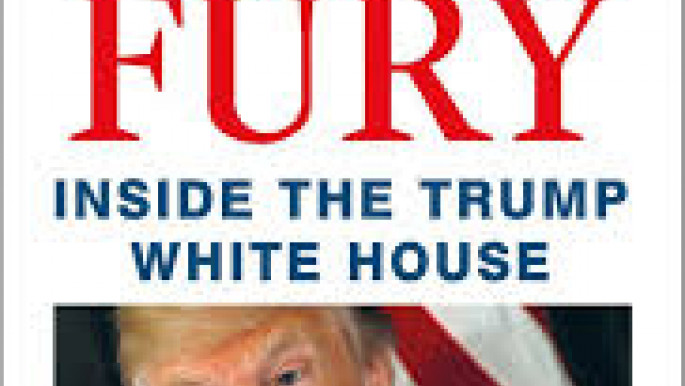
Fire and Fury: The president who wasn't meant to be
Concerns about the media's Trumpmania have been voiced in varies quarters, American freelance reporter Sulome Anderson, was forced back to New York as interest in foreign news dried up due to the American media's obsession with the weird world of president Trump.
It is little surprise, then, that media coverage of Michael Wolff's new book, "Fire and Fury: Inside the Trump White House", zeroed in on less than flattering depictions of Trump.
The consensus among pundits however, is that Wolff's book might be amusing, but it tells us little we did not already know, and will not convince any Trump supporters to reconsider their support.
Wolff was offered unrestricted access to Trump and his team and a portrait of a dangerously unprepared president emerges.
Trump was not supposed to be president. Nobody in his 2016 campaign team believed he would win, not even the man himself. Sam Nunberg, Trump's aide, asked Trump while on the campaign, "But do you want to be president?" after Trump boasted to him about averting a Clinton landslide victory by tapping into FBI director James Comey's announcement that he would reopen the investigation into Clinton's hacked emails.
Nunberg received no response from Trump. Wolff claims the attitude among Trump's campaign team was not only that he would fail, but that he should probably not be president.
Roger Ailes, a former CEO of Fox News and friend of Trump, apparently told him that if he wanted a career in television, to run for president first.
 |
The Trump brand would grow more powerful, said Ailes, once he had lost the election, and a range of business opportunities would come his way |  |
Rumours ran rife about a possible deal granting Trump his own television network. The Trump brand would grow more powerful, said Ailes, once he had lost the election, and a range of business opportunities would come his way. Much to everyone' shock, though, he ended up winning.
 |
|
President Trump's immature nature, was, says Wolff, a constant source of fatigue for US officials. Upon his big trip to Saudi Arabia, Trump was greeted by leaders from across the Arab world, Egyptian president Sisi said to Trump, "You are a unique personality that is capable of doing the impossible."
Trump apparently responded; "Love your shoes. Boy, those shoes. Man…"
Trump, we learn, is uninterested in detail and averse to data, numbers and anything too complex. He openly wandered about firing his National Security Advisor General HR McMaster, because he found him to be "too boring".
A whimsical president easily swayed, it was hard for anyone to see him acting effectively in a foreign crisis. The first major test came in Syria, when President Assad launched a chemical attack on Khan Sheikhun. Initially, Trump seemed uninterested in the attack much to the delight of people such as Steve Bannon.
Attempts by his son-in-law Jared Kushner and McMaster to engage him on attack were unsuccessful, as it became clear that the president was more annoyed about having to think about the attack, than by the event itself.
Part of the trouble the military and intelligence community have, argues Wolff, is that they live in the old world of data and spreadsheets, none-of-which Trump cares much for.
However, the Khan Sheikhun attack did produce a wealth of images. Ivanka Trump, understanding how her father thinks, decided to prepare her own presentation on the attack.
Read more:What else could Trump's $18 million military parade buy?
She presented him with large photographs of children foaming at the mouth as a result of the attack, which disturbed him profoundly.
It was then that he decided to launch punitive strikes against the Assad regime, he told a business friend later that evening, "the foam - all that foam. These are just kids."
 |
Trump might be an unpredictable character, but a Trump doctrine does exist |  |
Trump's foreign policy is an important aspect of the book, which argues his understanding of the world can be divided into three spheres: Powers America can work with, powers it can't work with, and weaker nations it can disregard or sacrifice.
Fire and Fury contains some very important insights into the Trump White House, and while some of the stories are amusing, it makes some serious points about the administration of the 45th presidency.
Trump might be an unpredictable character, but a Trump doctrine does exist, and it is a key take away from the book.
Understanding the Trump doctrine requires moving the spotlight away from the theatrics of the man himself, or else the media - whose prime function is to hold power to account - will miss its most critical components.
Usman Butt is a multimedia television researcher, filmmaker and writer based in London. Usman read International Relations and Arabic Language at the University of Westminster and completed a Master of Arts in Palestine Studies at the University of Exeter.
Follow him on Twitter: @TheUsmanButt
Opinions expressed in this article remain those of the author and do not necessarily represent those of The New Arab, its editorial board or staff.





 Follow the Middle East's top stories in English at The New Arab on Google News
Follow the Middle East's top stories in English at The New Arab on Google News


